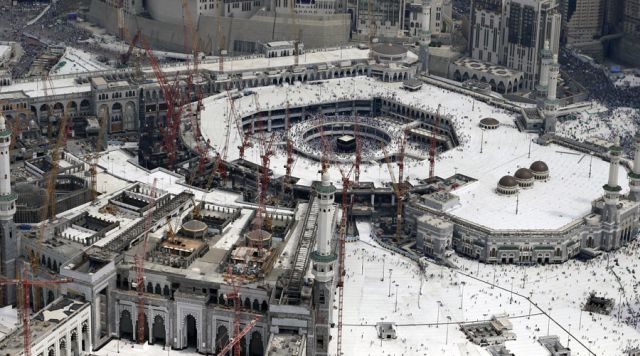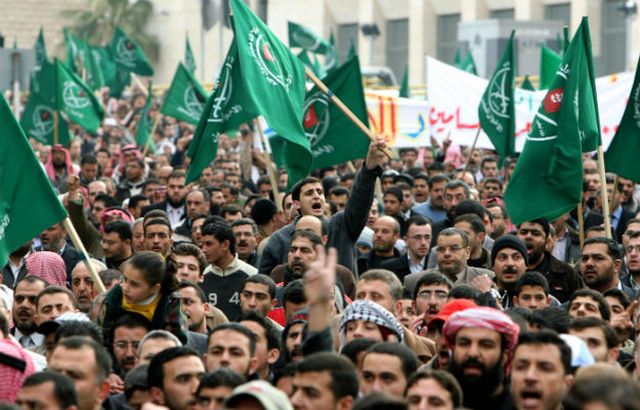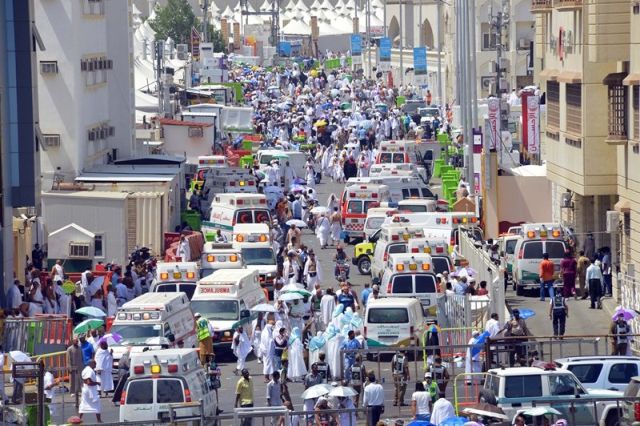
by Editor | May 25, 2021 | Investing, Muslim World
 Riyadh : Saudi Arabia on Monday announced a plan to launch a company to increase the capacity of the Grand Mosque in Mecca to accommodate pilgrims who are expected to reach more than 30 million by 2030.
Riyadh : Saudi Arabia on Monday announced a plan to launch a company to increase the capacity of the Grand Mosque in Mecca to accommodate pilgrims who are expected to reach more than 30 million by 2030.
The company’s establishment is in line with Vision 2030, which aims to provide an opportunity for the largest possible number of Muslims to perform Haj and Umrah and to enrich their experience through the development of the Grand Mosque.
The Public Investment Fund announced in a statement on Saudi Press Agency the launch of Rou’a Al Haram company to develop areas around the holy sites of Mecca and raise the quality of services in the local hospitality sector.
The projects will create around 160,000 job opportunities by 2030, with an estimated annual contribution to GDP of $2.1 billion, Xinhua news agency reported.
The first phase of the company’s projects will cover an area of 854,000 square metres, delivering 115 buildings of various architectural designs.
Altogether 70,000 new hotel rooms will enable the site to receive 310,000 visitors per day. Also, the first phase will see the development of around 9,000 residential units, 360,000 square metres of commercial space and prayer areas designated for more than 400,000 worshipers.
The project will be only less than 1.5 km away from the Kaaba, the most sacred site in Islam.
Rou’a Al Haram will raise the level of development in the areas surrounding the Grand Mosque, making it among the best examples of development worldwide, the report said.
Also, it will support job creation and investment as part of a wider plan to diversify the national economy.
Initial preparation works were underway, with construction due to start in 2018. The first phase of the project is anticipated to launch in 2024.
—IANS

by Editor | May 25, 2021 | Muslim World, Opinions
 By Dr. Saud bin Mohammed Al-Sati,
By Dr. Saud bin Mohammed Al-Sati,
September 23 marked the 87th anniversary of the National Day of the Kingdom of Saudi Arabia. This auspicious occasion not just celebrates the historic unification of the Kingdom but also invokes within every Saudi citizen a sense of immense pride in its historical and cultural legacy.
Our journey on the path of progress has continued over the last nine decades, making great strides in every domain. Our country is amongst the 20 largest economies in the world and we aim to improve our ranking by 2030. Currently, Saudi Arabia ranks an impressive 38 on the United Nations Development Program’s (UNDP) Human Development Index (HDI). We are further strengthening our investments efficiently to make our health, education, transportation and social services infrastructures even more robust and foster more progress and growth. To enable this growth and to build a thriving country, Crown Prince Mohammad bin Salman bin Abdulaziz Al Saud chalked out Vision 2030 around three fundamental themes — a vibrant society, a thriving economy and an ambitious nation. We are in relentless pursuit of the vision to make our country a pioneering and successful global model of excellence on all fronts.
We are transforming our education system to equip students with multi-faceted knowledge and values that help their individual characters emerge and flourish. To demonstrate our commitment to education, our country sanctioned 200 billion riyals in 2016 for the development and expansion of education — the highest annual allocation after healthcare. By 2030, we aim to have at least five Saudi universities among the top 200 universities in international rankings.
We are diversifying and unleashing the capabilities of promising sectors to create the new pillars of the Saudi economy. Our National Renewable Energy Program is all set to increase the share of renewables in the power mix from almost 0 to 4 per cent by generating 9.5 GW by 2023. Our endeavor includes privatising some state-owned assets and government services; developing tourism by creating attractions of the highest international standards; investing in a digital economy; incentivising the exploration of the Kingdom’s mineral resources; and doubling our gas production.
The Custodian of the Two Holy Mosques King Salman Bin Abdulaziz Al Saud views the citizens of the Kingdom as its most important asset. Vision 2030 strives to create a prosperous society wherein people enjoy a good life in a beautiful environment. The Red Sea luxury resorts project will be a milestone in this direction. Spread across 50 natural islands along 200 km of western coastline of Saudi Arabia, the project will place the Kingdom on the international tourism map. Apart from historical and cultural excursions, both on land and in the sea, it will offer opportunities for diving, parachuting, rock climbing, etc. The project is estimated to host one million visitors per annum by 2035, adding SAR 15 billion (Rs 25,905 crore) per annum to the Kingdom’s GDP. The newly mapped area will be run at par with international standards, including ecological best practices.
As the cradle of Islam, the Kingdom takes great pride in serving the Two Holy Mosques. This year more than two million pilgrims performed Haj. The number of Umrah visitors tripled to eight million over the last decade. We are working with the strategic objective of providing the opportunity for the largest number of Muslims possible to perform Haj and Umrah. The Custodian of the Two Holy Mosques King Salman bin Abdulaziz Al Saud launched in 2015 the third phase of expansion of the Grand Mosque which will cover 1.47 million square meters, including 78 new gates, six new floors for praying, 680 new escalators, 24 elevators for people with special needs.
Several transit projects have been sanctioned to elevate the existing facilities. The airports are being modernised and their capacities are being augmented. The Makkah Metro project, has been conceived to complement the rail services to transport visitors safely to the Holy Sites. Saudi Railways Commission recently completed the maiden test run of the Haramain high-speed rail line from Jeddah to Madinah. The 450-km network connecting the two holy cities is slated to attain speeds of up to 360 kmph, reducing the travel time between the two to less than two hours.
Political and economic stability in the Middle East and around the world is one of Saudi Arabia’s greatest priorities. My country has been recognised for its efforts over the years to maintain peace and stability in the region. From the King Fahd bin Abdulaziz Al Saud plan of 1981 and King Abdullah bin Abdulaziz Al Saud initiative of 2002, the Taif agreement of 1989 that ended the Lebanese civil war, to the 2007 Makkah agreement of reconciliation between the factions of Fatah and Hamas — we have primarily worked on mediation and conciliation to resolve issues and work towards the peace, stability, non-interference and prosperity of the region.
The Kingdom of Saudi Arabia has demonstrated its abiding belief in spreading goodwill and compassion beyond its borders by being at the forefront of the international community in terms of share of gross domestic product (GDP) earmarked for humanitarian aid. The King Salman Centre for Humanitarian Aid and Relief (KSRelief), since it was established in 2015, has provided humanitarian and development aid to more than 37 countries in four continents, implementing 218 projects in areas of food security, housing and shelter, preventative health care and education. Just recently and through the Center, the Kingdom donated $33.7 million to the World Health Organisation (WHO) to combat cholera in Yemen, followed by a donation of $33 million to United Nations Children’s Fund (UNICEF) at the end of July 2017.
It has been a great honour for me to serve as the Ambassador of Saudi Arabia to the Republic of India. India is a strategic partner in our journey of progress. We share deep-rooted bilateral ties that have been nourished through growing economic partnership, multi-faceted cooperation and vibrant people to people connection. The historical ties of friendship between the two countries will continue to grow and thrive through partnership and cooperation.
(The author is Saudi Ambassador to India)
—IANS

by Editor | May 25, 2021 | Muslim World
 Riyadh/Doha : A phone call between Saudi and Qatari leaders in an attempt to solve their diplomatic crisis has sparked new disputes as Riyadh accused Doha of distorting facts and cut off communication.
Riyadh/Doha : A phone call between Saudi and Qatari leaders in an attempt to solve their diplomatic crisis has sparked new disputes as Riyadh accused Doha of distorting facts and cut off communication.
Saudi Arabia’s Crown Prince Mohammed bin Salman received a phone call from Qatari Emir Sheikh Tamim Bin Hamad Al-Thani on Friday who requested a dialogue to end the three-month rift, reports Xinhua news agency.
During the phone call, the Qatari emir said he was willing to discuss the demands of four Arab countries led by Saudi Arabia for the best interests of related parties, the agency said.
Saudi Arabia, Bahrain, Egypt, the United Arab Emirates (UAE) severed diplomatic ties with Qatar on June 5, and imposed a blockade on the oil-rich Gulf nation, saying Doha supported terrorism and extremism, interfered in their internal affairs and sought closer ties with Iran.
Qatar has strongly denied the charges.
The four countries listed 13 demands, including scaling down diplomatic ties with Iran and shutting down a Turkish military base in Qatar, to end the crisis.
However, Doha’s state-run Qatar News Agency said Sheikh Tamim welcomed the proposal of Prince Mohammed to send envoys to resolve the ongoing crisis in a way that does not affect the sovereignty of the states.
In response, the official Saudi Press Agency published a statement disputing Qatar’s remarks, saying the call was at Doha’s request and announced Saudi Arabia will cut off all communication until “the authority in Qatar issued a clear statement clarifying its position in public”.
Qatar has not yet commented on Saudi Arabia’s statement.
Sheikh Tamim held a phone call with US President Donald Trump later on Friday, insisting that the Gulf diplomatic crisis should be resolved through constructive dialogue that does not affect the sovereignty of the states, according to Qatar News Agency.
During the conversation, the two leaders discussed the latest development related to the Gulf crisis through Kuwait’s mediation.
—IANS

by Editor | May 25, 2021 | Muslim World
 Cairo : An Egyptian court has decided to place 296 defendants loyal to the banned Muslim Brotherhood on the country’s terror list for three years.
Cairo : An Egyptian court has decided to place 296 defendants loyal to the banned Muslim Brotherhood on the country’s terror list for three years.
The defendants admitted during investigations that they joined the group, which was deemed as hampering the rule of law and harming national unity through temptations to topple the ruling authority, according to the Cairo Criminal Court on Wednesday, Xinhua reported citing MENA news agency.
The defendants confessed committing acts of violence against people and vital facilities of Armed Forces and police.
On Tuesday, the court made a similar decision against 56 brotherhood defendants.
Egypt has been launching a massive crackdown on the outlawed Muslim Brotherhood group since former President Mohammed Morsi, a brotherhood leader, was removed by the military in July 2013 after mass protests against his one-year rule.
A later dispersal of pro-Morsi sit-ins in the capital and nearby Giza left about 1,000 killed and thousands more arrested and facing mass trials.
Since then, growing anti-government terror attacks left hundreds of police and military men killed, with most of them claimed by a Sinai-based militant group loyal to the regional Islamic State (IS) group.
A judicial panel in charge of the group’s capital chain has previously seized funds of several Brotherhood-run businesses including supermarkets and private schools.
—IANS

by Editor | May 25, 2021 | Muslim World
 Riyadh : Iranians and Qataris are among the more than 1.7 million Muslims gathered in the holy city of Mecca for the Hajj pilgrimage, even though the governments in Tehran and Doha are at odds with Saudi Arabia.
Riyadh : Iranians and Qataris are among the more than 1.7 million Muslims gathered in the holy city of Mecca for the Hajj pilgrimage, even though the governments in Tehran and Doha are at odds with Saudi Arabia.
Despite closing the border with Qatar on June 5 as part of the Gulf countries’ economic and diplomatic offensive against the gas-rich emirate, Saudi Arabia has allowed 1,340 Qataris to enter the country for the Hajj.
Doha earlier refused Riyadh’s proposal to arrange charter flights for Qatari pilgrims.
The Saudi minister of Islamic Affairs, Saleh al-Sheikh, told his country’s official news agency SPA that the kingdom serves all pilgrims without discrimination or exclusion on the basis of nationality, tribe or sect.
Political tensions are overshadowing the great religious event, but have not prevented 86,500 Iranian pilgrims from coming to Mecca this year after they were excluded last year following a deadly stampede during the 2015 Hajj.
Nearly 2,500 people – including 400 Iranians – died in the stampede, which Riyadh blamed on the Iranians, while Tehran faulted the Saudi government.
The Jeddah-based International Islamic News Agency said that the pilgrims include 25,500 people from the United Kingdom, 20,500 from Russia, 17,000 from the United States and 10,000 from France, among many other nationalities.
For the first time, the Saudi Ministry of Education has established nurseries where parents can leave their children while they perform the rituals of the pilgrimage, which lasts several days and takes place in different places.
Some 15,000 officers will ensure the safety of the Hajj and escort the pilgrims, according to the director of security, Gen. Mohamed al-Sharif.
The head of Saudi civil defense, Suleiman al-Amro, said that more than 3,000 “machines and devices” had been deployed in the holy places to respond to possible emergencies.
Besides the deadly stampede, the 2015 Hajj was also marred by a crane accident at the Great Mosque that left 100 people dead.
—IANS

 Riyadh : Saudi Arabia on Monday announced a plan to launch a company to increase the capacity of the Grand Mosque in Mecca to accommodate pilgrims who are expected to reach more than 30 million by 2030.
Riyadh : Saudi Arabia on Monday announced a plan to launch a company to increase the capacity of the Grand Mosque in Mecca to accommodate pilgrims who are expected to reach more than 30 million by 2030.



